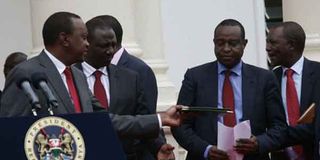Reduced Govt borrowing after Eurobond to help cut Kenya interest rates

President Uhuru Kenyatta and his Deputy William Ruto (left) hand over a file to National Treasury Cabinet Secretary Henry Rotich after addressing journalists at State House in Nairobi, June 25, 2014. On the right is Central Bank of Kenya (CBK) Governor Prof Njuguna Ndung'u EVANS HABIL | NATION
What you need to know:
- Kenya had planned to borrow Sh190.8 billion in the 2014/2015 budget. The government has vowed that this amount will now be reduced but did not provide details on how much it was willing to cut from domestic borrowing.
- Although Kenya sought Sh176 billion ($2 billion) from the international markets, the Eurobond was oversubscribed to a tune of Sh770 billion ($8.8 billion). This is an indication of investor confidence in Kenya.
- Most of the investors came from the United States which accounted for more than 60 per cent of buyers on both tranches of the Eurobond.
Kenya will reduce planned domestic borrowing for the coming financial year in a move that is likely to have ripple effects on consumer interest rates.
Speaking at a press conference Wednesday President Uhuru Kenyatta said the government would cut domestic borrowing for the 2014/2015 financial year following the success of its bid to borrow from international capital markets through a Eurobond.
Sales on the Eurobond closed on Tuesday and Kenya has already received Sh176 billion ($2 billion) raised through the government paper.
“With our plan to access international capital markets, we will reduce our recourse to domestic borrowing. Consequently, the government will review downwards domestic borrowing plans for the next financial year. This, together with other measures which we shall be implementing shortly, should result in a lower interest rate regime in Kenya,” said President Kenyatta.
Kenya had planned to borrow Sh190.8 billion in the 2014/2015 budget. The government has vowed that this amount will now be reduced but did not provide details on how much it was willing to cut from domestic borrowing.
It is expected that reducing government pressure on the domestic credit market will leave larger room for the private sector to borrow from commercial banks.
Funds raised from the Eurobond will be used to repay a Sh52.5 billion ($600 million) syndicated loan. The money will also be geared towards large infrastructure projects in the transport, agriculture and energy sectors.
The Eurobond comes in two tranches—a Sh44 billion ($500 million) tranche that matures in five years and a Sh131 billion ($1.5 billion) tranche that matures in 10 years.
Although Kenya sought Sh176 billion ($2 billion) from the international markets, the Eurobond was oversubscribed to a tune of Sh770 billion ($8.8 billion). This is an indication of investor confidence in Kenya.
Most of the investors came from the United States which accounted for more than 60 per cent of buyers on both tranches of the Eurobond.





